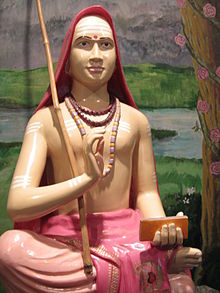Shiva Panchakshara Stotra

| Part of a series on |
| Hindu scriptures and texts |
|---|
 |
| Related Hindu texts |
The Shiva Panchakshara Stotra (Sanskrit: शिवपञ्चाक्षरस्तोत्र, romanized: śiva-pañcākṣara-stotra, lit. 'Hymn to the five syllables of Shiva') is a Hindu religious hymn (stotra) dedicated to god Shiva.[1] Comprising five stanzas, it is regarded to have been composed by the philosopher Adi Shankara.
Description
[edit]The panchakshara (Sanskrit: पञ्चाक्षर) literally means "five syllables" in Sanskrit,[2] referring to the five syllables of na, ma, śi, vā, and ya forming the mantra Om Namah Shivaya.[3] This hymn explains the significance of these five syllables and their affiliation with the deity.[4]
According to some texts, these five syllables are regarded to represent the five elements of the human body, the chanting of which is believed to energise them. Na is associated with prithvi (earth), ma is associated with jala (water) śi is associated with agni (fire) va is associated with vayu (air), and ya is associated with akasha (space).

Hymn
[edit]The first stanza of the Shiva Panchakshara Stotram is as follows:[5][6]
|
Original Sanskrit नागेन्द्रहाराय त्रिलोचनाय |
IAST transcription nāgēndrahārāya trilōcanāya |
English translation To the one wearing a garland of the chief of serpents, to the three-eyed one |
See also
[edit]References
[edit]- ^ Murty, A. Suryanarayana (1978). Sri Mukhalingam Temples, Including the Worship of Lord Siva, His Attributes. Bharatiya Vidya Bhavan. p. 48.
- ^ Prentiss, Karen Pechilis (2000-01-06). The Embodiment of Bhakti. Oxford University Press. p. 57. ISBN 978-0-19-535190-3.
- ^ Knapp, Stephen (2012-01-01). Hindu Gods & Goddesses. Jaico Publishing House. p. 104. ISBN 978-81-8495-366-4.
- ^ Ajai Kumar Chhawchharia (2021-02-19). 40= Lord Shiva Book 1 Sacred Hymns Of Lord Shiva. p. 88.
- ^ Nome, Edited by (2009-08-01). Advaita Devatam God of Nonduality. Society of Abidance in Truth. p. 45. ISBN 978-0-9703667-9-5.
((cite book)):|first=has generic name (help) - ^ Marga, Bhakti (2013-07-29). Atma Bhog: Bhajans of Bhakti Marga with Chords and Translations. Bhakti Marga Publications. p. 265. ISBN 978-3-940381-97-2.
| Main topics | |||||||
|---|---|---|---|---|---|---|---|
| Rituals |
| ||||||
| Mantras | |||||||
| Objects | |||||||
| Materials | |||||||
| Instruments | |||||||
| Iconography | |||||||
| Places | |||||||
| Roles | |||||||
| Sacred animals | |||||||
| Sacred plants |
| ||||||
| See also | |||||||
Text is available under the CC BY-SA 4.0 license; additional terms may apply.
Images, videos and audio are available under their respective licenses.
